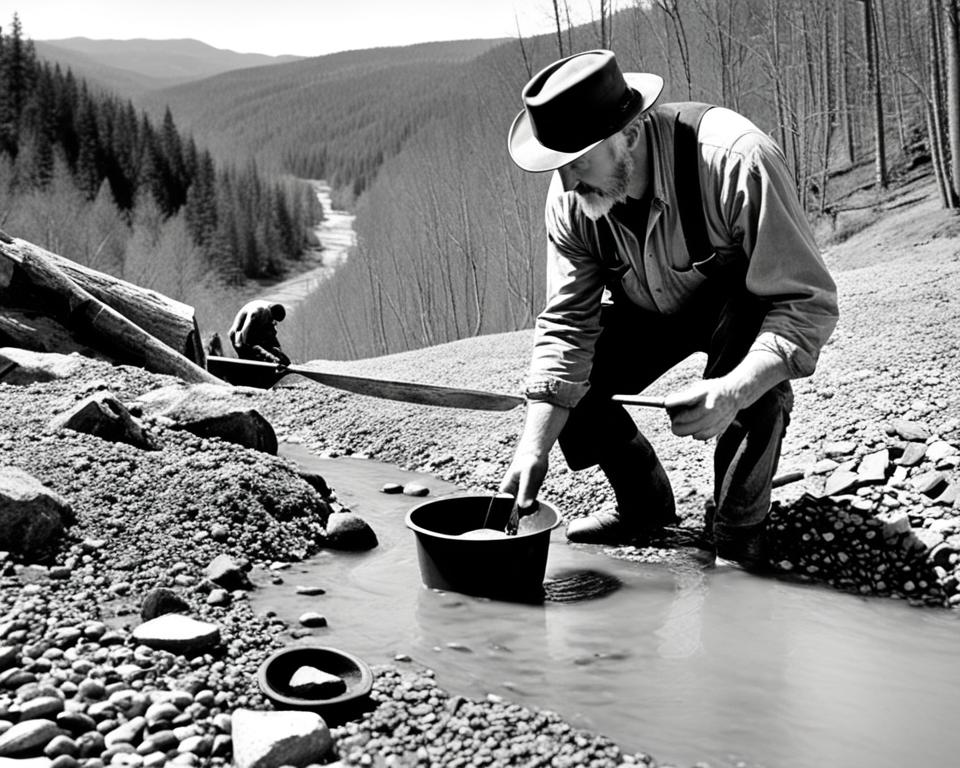
Gold panning in New Jersey is a popular recreational activity that allows prospectors to search for small particles of gold in rivers, streams, and other waterways. However, before grabbing your pan and heading out, it’s important to understand the laws and regulations surrounding this hobby. In New Jersey, gold panning is considered recreational prospecting and falls under the jurisdiction of the state’s Department of Environmental Protection (DEP).
To engage in gold panning legally, prospectors must obtain a permit from the DEP for recreational prospecting activities. These permits can be obtained online or through designated offices. By obtaining the necessary permit, prospectors can ensure that they are following the appropriate guidelines and regulations set by the state. These regulations are in place to protect the environment, preserve historical artifacts, and maintain the integrity of private property rights.
Key Takeaways:
- Gold panning in New Jersey is considered recreational prospecting and requires a permit from the Department of Environmental Protection (DEP).
- Prospectors should research and understand the specific regulations for each county in New Jersey.
- Respect private property rights and always obtain permission from landowners before prospecting on their property.
- Adhere to environmental guidelines to protect the local ecosystem.
- Ensure a responsible and enjoyable gold panning experience by following the rules and regulations set by the DEP.
Legal Gold Panning in New Jersey
Gold panning in New Jersey is legal for recreational purposes, allowing enthusiasts to enjoy this exciting activity. To engage in gold panning legally, prospectors must obtain a permit from the New Jersey Department of Environmental Protection (DEP) for recreational prospecting activities. These permits are necessary to ensure compliance with the state’s regulations and to protect the environment.
Obtaining a gold panning permit is a straightforward process that can be completed online or through designated DEP offices. By obtaining a permit, prospectors can embark on their gold panning adventures with confidence, knowing that they are adhering to the rules and regulations set forth by the DEP.
It’s important to note that different areas within New Jersey may have specific rules and restrictions in addition to the general guidelines provided by the DEP. As such, it is essential for gold panners to familiarize themselves with the specific rules for their chosen location.
By following the legal requirements and guidelines, gold panners can enjoy their recreational prospecting activities while preserving the environment and ensuring a responsible and enjoyable experience for themselves and future prospectors.

Recreational Gold Panning Rules
Recreational gold panners in New Jersey must adhere to certain rules to protect the environment and ensure responsible prospecting. Here are some key rules to keep in mind:
- Obtain a permit from the New Jersey Department of Environmental Protection (DEP) before engaging in gold panning.
- Respect private property rights and obtain permission from landowners before entering their property for prospecting purposes.
- Follow all guidelines and restrictions set forth by the DEP and any additional rules specific to the chosen location.
- Minimize environmental impact by practicing proper panning techniques, avoiding disturbance to natural habitats, and properly disposing of waste.
- Report any significant historical artifacts or findings to the appropriate authorities to aid in preserving New Jersey’s history.
By adhering to these rules and guidelines, recreational gold panners can enjoy their hobby while protecting New Jersey’s natural resources and historical heritage.
Best Spots for Gold Panning in New Jersey
The Delaware River and the Raritan River are among the best spots for gold panning in New Jersey. These rivers have a rich history of gold deposits and have attracted prospectors for years.
Along the Delaware River, the stretch between Phillipsburg and Trenton has been particularly known to yield promising results. This section of the river offers ample opportunities for gold panning, with its gravel bars and small tributaries.

Similarly, the Raritan River is another popular spot for gold panning. Prospectors have reported finding fine flakes of gold along the river’s banks. Exploring smaller creeks and streams that are often untouched by other prospectors can also increase the chances of finding gold.
To ensure a successful and legal gold panning adventure, it’s important to research local regulations and obtain any necessary permits or permissions before heading out to these locations. By following the rules and respecting the environment, prospectors can enjoy the thrill of gold panning while preserving the natural beauty of New Jersey’s rivers.
Tips for Successful Gold Panning in New Jersey
Embarking on a gold panning adventure in New Jersey requires careful research and planning. By following these tips, you can increase your chances of a successful and enjoyable experience.
1. Research and Plan: Before heading out, research areas with a history of gold mining or known deposits. This will help you focus your efforts and increase your chances of finding gold.
2. Use the Right Equipment: Equip yourself with the necessary tools for gold panning. This includes a reliable gold pan, a sturdy shovel, classifier screens to separate materials, and safety gear such as gloves and boots.
3. Learn Proper Technique: Take the time to learn and practice proper gold panning techniques. Mastering gentle swirling motions will help wash away lighter sediment while retaining heavier materials, like gold, in your pan.
4. Be Patient and Persistent: Gold panning is a patient person’s game. It takes time and persistence to find gold. Don’t get discouraged if you don’t strike it rich immediately. Keep trying, and success will come.
5. Respect Nature and Follow Regulations: Always respect the environment while gold panning. Leave no trace behind, follow regulations set by the Department of Environmental Protection, and obtain any necessary permits. By doing so, you ensure the preservation of New Jersey’s natural beauty and historical artifacts.
Remember, successful gold panning in New Jersey requires preparation, technique, and perseverance. By following these tips, you’ll be well-equipped to embark on a rewarding gold panning adventure.
| Tips for Successful Gold Panning in New Jersey |
|---|
| Research and Plan |
| Use the Right Equipment |
| Learn Proper Technique |
| Be Patient and Persistent |
| Respect Nature and Follow Regulations |
Public vs. Private Areas for Gold Panning in New Jersey
Gold panners in New Jersey have the option to pan for gold on both public and private lands. The state designates certain rivers and streams as public lands for recreational gold prospecting, allowing prospectors to pan without legal restrictions. Two popular public spots for gold panning in New Jersey are the Delaware River and the Raritan River.
On public lands, prospectors can explore the riverbanks and try their luck in finding gold. These areas often attract a larger number of prospectors, resulting in more competition. However, they offer the advantage of being easily accessible and free to use.
“The Delaware River and the Raritan River are fantastic public areas where gold panners can enjoy their hobby without any legal restrictions.”
For those seeking a more exclusive and controlled experience, some landowners in New Jersey allow gold panning on their private properties. These properties may require a fee or membership to access and pan for gold.
Before entering private property for gold panning, it is crucial to obtain permission from the landowner and adhere to any rules they have in place. Respecting private property rights is essential for maintaining a positive relationship with landowners and protecting their properties.
Whether prospecting on public lands or private properties, it is important to follow all rules, regulations, and environmental guidelines to ensure a responsible and enjoyable gold panning experience.
Essential Equipment for Gold Panning in New Jersey
Having the right equipment is crucial for a successful gold panning adventure in New Jersey. Here are the essential tools you’ll need:
- Gold Pan: A sturdy gold pan with riffles or ridges along the bottom is essential for trapping and capturing small particles of gold. Look for pans made of durable materials like steel or plastic.
- Shovel: A shovel or trowel is necessary for digging into soil or gravel near streams. Choose a lightweight yet sturdy shovel that can handle the rigors of prospecting.
- Classifier Screens: Classifier screens or mesh sieves help separate larger rocks from smaller sediment containing gold. This allows you to focus on the material most likely to contain gold particles.
- Safety Gear: Your safety is paramount while gold panning. Invest in safety gear like gloves and boots to protect against rough surfaces and provide stability in uneven terrain. Additionally, wear appropriate clothing to shield yourself from the elements.
It’s also important to bring along basic supplies such as water bottles, sunscreen, bug spray, and snacks. These essentials will keep you hydrated, protected, and energized during your gold panning expeditions in New Jersey.
Joining a Metal Detecting Club in New Jersey
Are you passionate about metal detecting and looking to connect with fellow enthusiasts in New Jersey? Joining a metal detecting club can be a fantastic way to enhance your experience, gain valuable knowledge, and become part of a supportive community. Two notable metal detecting clubs in New Jersey are the New Jersey Gold Prospectors Association and the New Jersey Mining and Fossicking Club.
By joining a metal detecting club, you’ll have the opportunity to meet like-minded individuals who share your enthusiasm for treasure hunting. These clubs often organize group outings, events, and regular meetings where members can exchange tips, tricks, and stories about their metal detecting adventures.
One of the main advantages of joining a metal detecting club is the opportunity to learn from experienced members. These individuals have honed their skills over time and can provide invaluable guidance on the best techniques for successful metal detecting in New Jersey.
Furthermore, metal detecting clubs often have extensive knowledge about the best areas for metal detecting in the state. They can share information about public lands, beaches, rivers, and other locations where you’re likely to find interesting artifacts and valuable treasures.
Beyond the practical benefits, joining a metal detecting club also offers a sense of belonging and community. You’ll have the chance to forge friendships with people who share your passion and dedication to this exciting hobby. Connecting with other enthusiasts can make your metal detecting adventures even more enjoyable and rewarding.
Benefits of Joining a Metal Detecting Club in New Jersey:
- Access to valuable knowledge and expertise
- Opportunities for group outings and events
- Tips and tricks from experienced members
- Information about the best metal detecting areas in New Jersey
- A supportive and welcoming community of like-minded individuals
Joining a metal detecting club can unlock a treasure trove of knowledge and camaraderie. Whether you’re a beginner or a seasoned detectorist, the New Jersey Gold Prospectors Association and the New Jersey Mining and Fossicking Club are excellent options to consider.
| Club Name | Contact Information |
|---|---|
| New Jersey Gold Prospectors Association | Contact: John Smith Email: [email protected] Website: www.njgoldprospectors.org |
| New Jersey Mining and Fossicking Club | Contact: Jane Johnson Email: [email protected] Website: www.njminingclub.org |
Metal Detecting Laws in New Jersey
Metal detecting in New Jersey is an exciting recreational activity, but it’s essential to be aware of the laws and regulations surrounding this hobby. The rules may vary depending on the location, so it’s crucial to understand the specific requirements and restrictions to ensure a responsible and legal experience.
The Archeological Resources Preservation Act governs metal detecting on government property in New Jersey. This legislation aims to protect valuable historical and cultural artifacts from being damaged or removed. Metal detecting is generally prohibited in historically significant areas and requires permission from the appropriate authorities to avoid potential penalties.
When it comes to metal detecting on private property, obtaining written permission from the owner or tenant is essential. Respecting individuals’ property rights is crucial, and trespassing without permission is both illegal and unethical.
It’s important to note that metal detecting is prohibited on Trust’s property without permission. Always make sure to obtain the necessary permission or membership from the property owner before conducting any metal detecting activities.
By adhering to the metal detecting laws in New Jersey, you can enjoy your hobby while respecting the historical and cultural significance of different areas. Remember to obtain the required permissions, whether it’s on government property or private land, to ensure a safe and enjoyable metal detecting experience.
| Location | Metal Detecting Permissions |
|---|---|
| Government Property | Permission required; governed by the Archeological Resources Preservation Act |
| Historically Significant Areas | Generally prohibited; contact the appropriate authorities for exceptions |
| Private Property | Written permission from the owner or tenant is necessary |
| Trust’s Property | Prohibited without permission or membership |
Remember to conduct thorough research, familiarize yourself with regional regulations, and obtain the necessary permissions before embarking on your metal detecting adventures in New Jersey.
Metal Detecting Locations in New Jersey
New Jersey offers a diverse range of metal detecting locations, ranging from picturesque beaches to meandering rivers, streams, and even ghost towns. Whether you’re a seasoned treasure hunter or a beginner, these locations are sure to entice your metal detecting passion.
1. Beautiful Beaches
When it comes to metal detecting in New Jersey, the state’s beautiful beaches are a popular choice. Brigantine Beach, Sandy Hook Beach, and Long Branch Beach are just a few examples of beaches where you can comb the sand in search of hidden treasures. From lost jewelry and coins to historical artifacts, the possibilities are endless.
2. Pristine Rivers and Streams
The rivers and streams of New Jersey provide another exciting opportunity for metal detecting enthusiasts. The Raritan River and the Delaware River are well-known locations where treasures have been discovered. Explore the banks and shallow waters, and you might uncover coins, jewelry, or even relics from the past.
3. Uncover Ghost Town Secrets
For those seeking a more adventurous metal detecting experience, exploring ghost towns and abandoned buildings in New Jersey can offer intriguing discoveries. These forgotten remnants of the past hold the potential for uncovering unique artifacts and relics with historical significance. Exercise caution and always obtain permission before exploring private properties.
Remember, before embarking on your metal detecting adventure, it’s essential to research local regulations and obtain any necessary permits. Respecting the environment and obtaining proper permissions ensures a responsible and enjoyable experience for both you and future treasure seekers.
Conclusion
In conclusion, the state of New Jersey provides enthusiasts with exciting opportunities for both gold panning and metal detecting. By abiding by the Gold Panning Laws in New Jersey, securing the necessary permits, and respecting private property rights, prospectors and metal detectorists can enjoy their activities responsibly.
Success in gold panning and metal detecting in New Jersey relies on thorough research of the best spots, using the appropriate equipment, employing proper techniques, and maintaining patience and persistence. Additionally, joining metal detecting clubs like the New Jersey Gold Prospectors Association and the New Jersey Mining and Fossicking Club can enhance the overall experience by offering valuable knowledge and fostering a sense of community.
Whether one chooses to explore the rivers and streams for gold or embark on metal detecting adventures along New Jersey’s beaches, the state promises a range of possibilities for treasure seekers. By following the regulations, honing their skills, and immersing themselves in these exciting hobbies, prospectors and metal detectorists can embark on thrilling journeys filled with discoveries and memorable experiences.
Source Links

Meet Ryan Conlon, the passionate owner and driving force behind Pan for Treasure.
With an unwavering love for the art of gold panning, Ryan has transformed his enthusiasm into a thriving community hub for fellow treasure seekers. [email protected]
A seasoned gold panning enthusiast, Ryan’s journey began with a simple pan and a dream, evolving into a deep appreciation for the history, geology, and thrill of uncovering precious metals.

